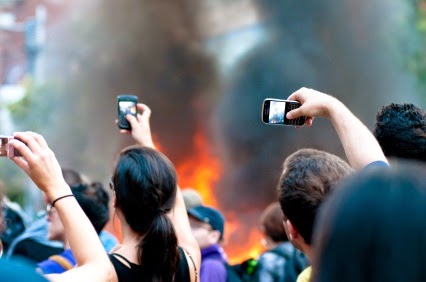We currently live in a time where just about anyone can be a journalist. You don't need a qualification and you don't even need to get paid for it. All that you need is an email address.
In the age when blogging is so prominent and widespread, the presence of social media allows anyone to report the various events taking place throughout the world and offer their opinion on them. The internet has made the world smaller, allowing us to communicate directly with people we will likely never meet in real life.
As seen in the above photo, through websites and apps such as Twitter, Instagram and Flickr everyday citizens can share information as it happens and this can soon spread worldwide. Anyone can now collect, report and analyze information, publishing it as they see fit. Due to these technological advances, citizens have been able to report massive news stories faster than traditional reporters, as was the case with Occupy Wall Street and the 2010 Haiti earthquake. Though there has been much argument about how much access the general public should have to this information...
Internet censorship is a sensitive subject, without a doubt. There are both positive and negative factors involved, with some using the concept to protect children from inappropriate content while others use it to control access to free information in certain parts of the world.
Parents are often in support of internet censorship because it prevents their children from being exposed to unsavoury and even damaging things like pornography and bigotry. Those who oppose internet censorship would suggest that parents simply monitor the sites their children are visiting, but as parents will tell you it is very difficult if not impossible to constantly oversee someone's internet use.
Multiple countries such as Iran, China and Saudi Arabia have restrictions when it comes to accessing certain information. In Myanmar the government allegedly keeps internet cafes under constant surveillance with computers that automatically take screenshots every few minutes. China has an advanced filtering system known as the "Great Firewall of China" which searches new web pages and restricts access in real time, while in Cuba there is no longer any such thing as private internet access.
Several organisations have been founded with the sole purpose of ending internet censorship including the OpenNet Initiative, Reporters Without Borders and the Censorware Project. These groups work to increase awareness of the effects this issue is having, with instalments in several of the world's top universities.
While citizen journalism has it's advantages in that it allows for wider and faster coverage of news stories, a disadvantage is that in does diminish the credibility of legitimate reporters. People have every right to view and take advantage of this information, and while preventing children from viewing inappropriate content is essential, keeping adults from making accessing important is not only doing them a huge disservice but it borders on dictatorship.


No comments:
Post a Comment